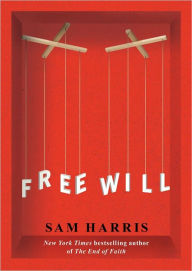31. Free Will - Sam Harris (📱)
28 Jun 2017
Rating 8.5/10
Reading Notes:
How can we make sense of our lives, and hold people accountable for their choices, given the unconscious origins of our conscious minds?
Free will is an illusion. Our wills are simply not of our own making. Thoughts and intentions emerge from background causes of which we are unaware and over which we exert no conscious control. We do not have the freedom we think we have.
The popular conception of free will seems to rest on two assumptions: (1) that each of us could have behaved differently than we did in the past, and (2) that we are the conscious source of most of our thoughts and actions in the present. As we are about to see, however, both of these assumptions are false.
A moment or two of serious self-scrutiny, and you might observe that you no more decide the next thought you think than the next thought I write.
We are conscious of only a tiny fraction of the information that our brains process in each moment. Although we continually notice changes in our experience—in thought, mood, perception, behavior, etc.—we are utterly unaware of the neurophysiological events that produce them.
The intention to do one thing and not another does not originate in consciousness—rather, it appears in consciousness, as does any thought or impulse that might oppose it.
Our sense of free will results from a failure to appreciate this: We do not know what we intend to do until the intention itself arises.
Consider what it would take to actually have free will. You would need to be aware of all the factors that determine your thoughts and actions, and you would need to have complete control over those factors. But there is a paradox here that vitiates the very notion of freedom—for what would influence the influences? More influences? None of these adventitious mental states are the real you. You are not controlling the storm, and you are not lost in it. You are the storm.
How can we be “free” as conscious agents if everything that we consciously intend is caused by events in our brain that we do not intend and of which we are entirely unaware? We can’t. To say that “my brain” decided to think or act in a particular way, whether consciously or not, and that this is the basis for my freedom, is to ignore the very source of our belief in free will.
Choices, efforts, intentions, and reasoning influence our behavior—but they are themselves part of a chain of causes that precede conscious awareness and over which we exert no ultimate control.
One of the most refreshing ideas to come out of existentialism (perhaps the only one) is that we are free to interpret and reinterpret the meaning of our lives.
Take a moment to think about the context in which your next decision will occur: You did not pick your parents or the time and place of your birth. You didn’t choose your gender or most of your life experiences. You had no control whatsoever over your genome or the development of your brain. And now your brain is making choices on the basis of preferences and beliefs that have been hammered into it over a lifetime—by your genes, your physical development since the moment you were conceived, and the interactions you have had with other people, events, and ideas. Where is the freedom in this? Yes, you are free to do what you want even now. But where did your desires come from?
Many philosophers, including me, understand free will as a set of capacities for imagining future courses of action, deliberating about one’s reasons for choosing them, planning one’s actions in light of this deliberation and controlling actions in the face of competing desires.
It is not that free will is simply an illusion—our experience is not merely delivering a distorted view of reality. Rather, we are mistaken about our experience. Not only are we not as free as we think we are—we do not feel as free as we think we do. Our sense of our own freedom results from our not paying close attention to what it is like to be us. The moment we pay attention, it is possible to see that free will is nowhere to be found, and our experience is perfectly compatible with this truth.